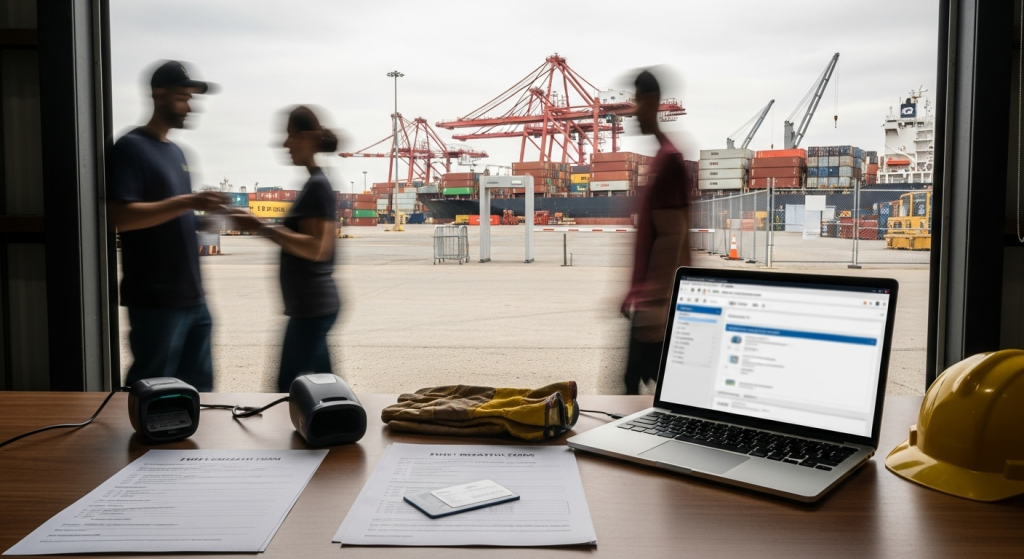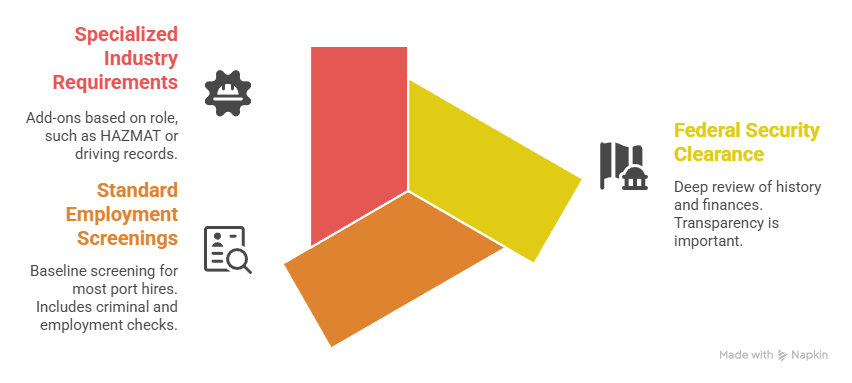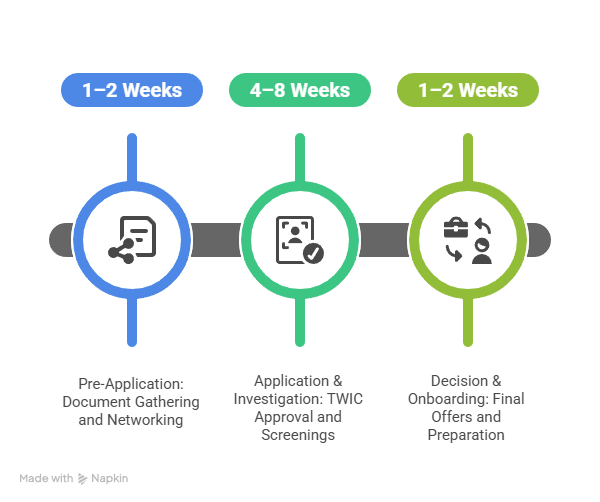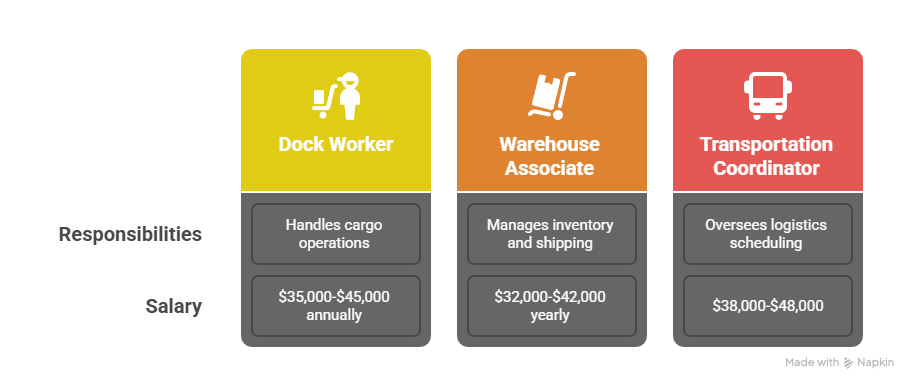New Jersey port logistics background checks require comprehensive federal screening including TWIC card certification, criminal history review, and security threat assessment under Maritime Transportation Security Act guidelines. The 4-8 week process involves multiple verification layers but opens access to high-paying careers in one of America's busiest transportation hubs.
Key Takeaways
- TWIC card certification costs $125.25 and takes 4-6 weeks to process for port access
- Background checks examine criminal history, employment records, and federal security threats
- Serious crimes like terrorism and violent felonies result in automatic disqualification
- New Jersey's "Ban the Box" law delays criminal history inquiries until after conditional offers
- Entry-level port positions start at $32,000-$48,000 with advancement to $120,000+ management roles
Introduction
When it comes to securing employment at the Port of New York and New Jersey, understanding the New Jersey port logistics background check process is essential for career success. This comprehensive screening system protects one of America's busiest transportation hubs while creating thousands of employment opportunities for qualified candidates. Whether you're a job seeker entering the maritime industry or an HR professional managing port workforce recruitment, mastering these requirements ensures compliance and opens doors to lucrative logistics careers.
Understanding New Jersey Port Security Requirements

The New Jersey port logistics background check system operates under strict federal oversight through the Maritime Transportation Security Act (MTSA). This comprehensive framework evaluates criminal history, employment records, and potential security threats to safeguard critical infrastructure. The process involves multiple screening layers, including Transportation Worker Identification Credential (TWIC) verification, FBI criminal history reviews, and specialized industry assessments.
Port authorities implement these measures to protect international trade operations worth billions annually. Every worker accessing secure maritime zones must demonstrate trustworthiness through rigorous vetting procedures. The background check timeline typically spans 4-8 weeks, requiring patience and thorough preparation from applicants.
Essential TWIC Card Requirements
Eligibility and Application Process
The Transportation Worker Identification Credential serves as your gateway to port employment opportunities. Obtaining this federal credential requires proving U.S. citizenship or legal residency, presenting valid government identification, and clearing comprehensive background screenings. The TSA conducts security threat assessments that examine criminal records, immigration status, and potential terrorism connections.
| Requirement | Details | Processing Time |
| Citizenship Proof | Birth certificate or passport | Immediate verification |
| Background Check | FBI criminal history review | 2-4 weeks |
| Security Assessment | TSA threat evaluation | 4-6 weeks |
Application steps include online pre-enrollment, appointment scheduling, document submission, and biometric data collection. Processing typically requires 4-6 weeks, with some cases extending longer due to additional security reviews. The $125.25 fee covers application processing and credential production costs. Candidates should maintain regular communication with enrollment centers and track application progress through official TSA portals to ensure timely completion of all requirements.
Enrollment Locations
Strategic enrollment center locations throughout the New York-New Jersey metropolitan area provide convenient access for prospective port workers. These facilities handle high application volumes, particularly during peak hiring seasons, making appointment scheduling and proper documentation essential for efficient processing.
| Enrollment Location | Details |
|---|---|
| Newark Enrollment Center | Address: Raymond Plaza, 532 Raymond Blvd., Newark, NJ Hours: Monday-Friday, 9AM - 3PM |
| New York Enrollment Center | Address: 247 W 35th St., New York, NY Hours: Monday, Wednesday, Friday, 9AM - 3PM |
Early arrival prevents delays, as these centers experience high volume during peak application periods. Applicants should bring all required documentation in original form and arrive prepared for biometric collection, including fingerprinting and digital photography. Both locations offer multilingual support and accessibility accommodations for applicants with disabilities.
Types of Background Screening in Port Logistics

Federal Security Clearance Investigations
High-security positions involving classified information or critical infrastructure protection require extensive federal screening. These investigations examine personal history, financial stability, international associations, and character references through detailed interviews. The process can extend several months, involving thorough verification of disclosed information and interviews with family, friends, and colleagues.
Customs and cargo screening roles often fall under this category due to their sensitive nature. Candidates should prepare for comprehensive scrutiny and maintain transparency throughout the evaluation process.
Standard Employment Screenings
Most port logistics positions require comprehensive verification procedures that confirm applicant qualifications, character, and suitability for security-sensitive maritime environments. These screenings form the backbone of port security protocols and ensure all personnel meet federal standards for accessing restricted areas. Employers typically conduct these checks after extending conditional job offers, following New Jersey's fair hiring practices.
- Criminal History Review: Searches federal, state, and local records for convictions and pending charges
- Employment Verification: Confirms previous work experience and performance records
- Education Confirmation: Validates educational credentials and certifications
- Reference Checks: Contacts professional and personal references for character assessment
- Motor Vehicle Records: Reviews driving history for transportation-related positions
These screenings typically complete within 2-3 weeks and form the foundation of most hiring decisions. The thoroughness of background investigations reflects the critical importance of port security in national infrastructure protection, with employers maintaining strict standards to ensure workforce reliability and trustworthiness in sensitive maritime operations.
Specialized Industry Requirements
Certain logistics roles demand additional screening based on specific responsibilities. Hazardous materials handling requires safety compliance history and specialized training verification. Commercial driver positions involve comprehensive driving record analysis and license validation, while financial management roles include credit checks and financial responsibility assessments.
Understanding position-specific requirements helps candidates prepare appropriate documentation and address potential concerns proactively.
Disqualifying Factors and Mitigation Strategies
Automatic Disqualifiers
Certain criminal convictions permanently bar employment in port logistics due to national security concerns. Terrorism-related offenses, espionage or treason, and violent felonies including murder, assault, and armed robbery result in automatic disqualification. These restrictions are non-negotiable and reflect the critical importance of port security in national infrastructure protection.
Candidates with such convictions must explore alternative employment pathways outside the maritime logistics sector.
Discretionary Factors
While certain criminal convictions result in automatic disqualification from port logistics employment, many other offenses fall into discretionary categories where hiring decisions depend on multiple factors and individual circumstances. These discretionary reviews allow employers to consider the full context of past offenses, including rehabilitation efforts, time elapsed since conviction, and demonstrated behavioral changes. The evaluation process examines both the nature of the offense and the candidate's subsequent actions to rebuild trust and responsibility. Understanding these discretionary factors empowers candidates with past legal issues to present compelling cases for employment eligibility through proper preparation and honest disclosure.
Other offenses may trigger additional review without automatic disqualification:
| Offense Category | Consideration Factors | Mitigation Opportunities |
| Drug-Related | Type, frequency, rehabilitation evidence | Treatment completion, clean lifestyle demonstration |
| Financial Crimes | Severity, time elapsed, responsibility rebuilding | Stable financial history, restitution efforts |
| Transportation Violations | Relevance to role, pattern analysis | Clean driving record maintenance, safety training |
Successful mitigation often depends on demonstrating rehabilitation, maintaining clean records, and providing strong character references. The discretionary review process recognizes that past mistakes don't necessarily predict future behavior, particularly when candidates have taken meaningful steps toward personal and professional improvement. Employers value evidence of sustained positive change, including community involvement, continuing education, stable employment history, and strong personal references. Candidates who proactively address past issues and present comprehensive mitigation evidence significantly improve their chances of favorable hiring decisions. The key to success lies in transparency, accountability, and demonstrating genuine commitment to maintaining the highest standards of professional conduct in sensitive maritime security environments.
Rehabilitation and Time Factors
Time elapsed since conviction significantly influences hiring decisions. Candidates can strengthen applications through community service participation, educational program completion, stable employment history, and professional references. Addressing past issues directly with potential employers often yields better outcomes than avoiding discussion.
These mitigation strategies demonstrate personal growth and commitment to maintaining professional standards in sensitive security environments.
Legal Rights and Compliance Framework
The Fair Credit Reporting Act governs employer use of background information during hiring processes. Employers must provide disclosure before conducting checks and obtain written authorization from candidates. If adverse employment decisions result from background findings, employers must follow specific notification procedures, including pre-adverse action notices and final decision explanations.
New Jersey's Opportunity to Compete Act enhances these protections through "Ban the Box" provisions. This legislation delays criminal history inquiries until after initial interviews, allowing qualifications to receive primary consideration. Background checks occur only after conditional offers, creating fairer evaluation processes.
Candidates have rights to review background reports, dispute inaccuracies, and receive explanations for adverse decisions. Understanding these protections empowers applicants to navigate the process confidently and address issues appropriately.
Application Timeline and Process Management
Understanding the port logistics background check timeline helps candidates plan effectively and avoid common delays that can jeopardize employment opportunities. Strategic timing and proactive preparation significantly improve success rates while reducing stress throughout the lengthy verification process. Employers and candidates alike benefit from clear expectations regarding each phase's duration and requirements.

Pre-Application Phase (1-2 Weeks)
Successful candidates begin preparation well before submitting applications. Essential steps include gathering required documents, conducting personal background reviews, and initiating TWIC card applications. Networking with industry professionals provides valuable insights into specific employer expectations and available opportunities.
Document organization prevents delays during formal application processes. Required materials typically include birth certificates, social security cards, government-issued identification, and relevant certifications.
Application and Investigation (4-8 Weeks)
The investigation phase represents the longest portion of the timeline, involving comprehensive security assessments and credential processing. TWIC card approval can require up to 60 days, while employer-specific screenings add additional time. Maintaining communication with prospective employers and monitoring application status online helps identify and address potential delays.
Federal clearance requirements extend timelines significantly for sensitive positions. Candidates should plan accordingly and use waiting periods productively by developing relevant skills and certifications.
Decision and Onboarding (1-2 Weeks)
Final hiring decisions follow completed background investigations, leading to formal job offers and onboarding processes. Successful candidates should remain accessible for last-minute verification requests and prepare required documentation for employment start dates.
Professional responsiveness during this phase reinforces positive impressions and supports smooth transitions into new roles.
The multi-phase background check process requires patience and strategic planning, but proper preparation significantly improves outcomes. Candidates who understand timeline expectations and maintain professional communication throughout screening phases position themselves advantageously in the competitive port logistics employment market. Success depends on early preparation, honest disclosure, and persistent follow-through during each verification stage.
Career Opportunities in New Jersey Port Logistics
The New Jersey port logistics sector offers diverse career pathways with competitive compensation and strong advancement potential. From entry-level positions requiring minimal experience to executive roles demanding specialized expertise, the industry provides opportunities for professionals at every career stage. Understanding salary ranges and progression pathways helps candidates make informed decisions about their maritime logistics careers.
Entry-Level Positions

New professionals can access the industry through various starting roles that provide practical experience and advancement opportunities:
- Dock Worker: Handles cargo operations with salaries ranging $35,000-$45,000 annually
- Warehouse Associate: Manages inventory and shipping with earnings of $32,000-$42,000 yearly
- Transportation Coordinator: Oversees logistics scheduling with compensation between $38,000-$48,000
These positions require minimal previous experience while offering comprehensive on-the-job training in maritime operations.
Advanced Career Paths
Experienced professionals can pursue leadership roles offering substantial compensation and responsibility. Operations managers direct daily port activities with salaries of $70,000-$90,000 annually, while supply chain directors oversee strategic logistics planning with earnings between $85,000-$120,000. Specialized inspectors focus on safety and compliance with compensation ranging $50,000-$80,000.
Career advancement often depends on continuous education, industry certifications, and demonstrated leadership capabilities within the expanding logistics sector.
The port logistics industry's growth trajectory creates expanding opportunities for career development and financial advancement. Successful navigation of background check requirements opens doors to stable employment in an essential sector that supports international commerce. With proper preparation and commitment to professional development, candidates can build rewarding careers that contribute to America's critical transportation infrastructure while achieving personal financial goals.
Best Practices for Successful Applications
Thorough preparation significantly improves application success rates across all screening phases. Strategic planning and proactive measures help candidates navigate the complex background check requirements while positioning themselves competitively in the port logistics job market. Understanding employer expectations and industry standards enables applicants to present themselves professionally throughout the entire screening process.
- Conduct Personal Background Assessments: Use online services to identify potential issues before employers discover them
- Build Professional Networks: Connect with port logistics community members for guidance and job referrals
- Obtain Relevant Certifications: Pursue OSHA safety, hazardous materials handling, or logistics management credentials
- Maintain Complete Honesty: Provide truthful information throughout the application process to build employer trust
- Organize Required Documents: Keep accurate records and prepare all necessary paperwork in advance
- Practice Professional Communication: Maintain courteous and responsive interactions during all screening phases
- Monitor Application Status: Track progress through official online portals to identify potential delays
- Continue Professional Development: Use waiting periods productively by completing relevant coursework or training
Success in port logistics background checks requires combining thorough preparation with ongoing professional development and honest communication. Candidates who invest time in understanding requirements, building industry relationships, and maintaining transparency throughout the process significantly increase their chances of securing employment. These best practices not only facilitate smoother background check processes but also demonstrate the professionalism and reliability that employers seek in maritime logistics personnel.
Conclusion
Successfully navigating the New Jersey port logistics background check process requires careful preparation, honest communication, and patience throughout the comprehensive screening procedures. Understanding TWIC requirements, federal compliance standards, and potential disqualifying factors enables candidates to address challenges proactively while maximizing their chances of securing employment in this lucrative industry. The investment in time and preparation pays substantial dividends through access to stable, well-compensated careers in one of America's most critical transportation networks. With proper planning and professional approach, qualified candidates can successfully transition into rewarding maritime logistics careers that offer both immediate employment and long-term advancement opportunities.
Frequently Asked Questions
How long does the New Jersey port logistics background check process take?
The complete background check process typically requires 4-8 weeks, including TWIC card processing and employer-specific investigations. Starting early accommodates potential delays and ensures timely employment start dates.
Can I work at New Jersey ports with a criminal record?
Employment with a criminal record depends on the offense type, timing, and rehabilitation evidence. While serious crimes like terrorism or violent felonies cause automatic disqualification, other offenses receive individual consideration based on job relevance and mitigation factors.
What documents do I need for a port logistics background check?
Required documents include government-issued photo identification, proof of work authorization, educational credentials, and any relevant certifications. Clear, accurate documentation speeds processing and prevents unnecessary delays.
How much does a TWIC card cost?
TWIC card applications cost $125.25, covering TSA processing and security assessment fees. This investment provides access to secure maritime facilities and numerous employment opportunities.
When can employers conduct background checks in New Jersey?
New Jersey's "Ban the Box" law requires employers to conduct background checks after making conditional job offers. This approach prioritizes qualifications over criminal history during initial screening phases.
What information appears on New Jersey background checks?
Background checks can reveal criminal records, employment history, education verification, credit reports, driving records, and drug screening results, depending on position requirements and employer policies.
How often should employers update background check procedures?
Annual reviews ensure compliance with evolving laws and best practices. Regular updates maintain accuracy, fairness, and legal compliance in hiring processes.
Do I need permission before running employee background checks?
Yes, written consent is required before conducting background checks, ensuring compliance with federal and state privacy laws while protecting applicant rights.
What should I do if my background check contains errors?
Contact relevant agencies to correct inaccuracies and provide supporting documentation. The FCRA grants rights to dispute errors and receive corrected information before final hiring decisions.
Are any positions exempt from New Jersey's "Ban the Box" law?
Law enforcement, corrections, judiciary, and certain sensitive security positions may conduct earlier criminal history inquiries due to specific job requirements and security considerations.
Additional Resources
- Port Authority of New York and New Jersey â Port Career Brochure
https://www.panynj.gov/content/dam/port/our-port/council-on-port-performance-pdf/port-career-brochure-01292020.pdf - New Jersey Department of Labor â Transportation, Distribution & Logistics Report
https://www.nj.gov/labor/labormarketinformation/assets/PDFs/pub/empecon/tdl.pdf - EEOC and Toyota Logistics Services â Settlement on Sex and Race Bias (New Jersey)
https://www.eeoc.gov/newsroom/eeoc-and-toyota-logistics-services-settle-lawsuit-alleging-sex-and-race-bias-new-jersey - TSA TWIC Enrollment Program
https://tsaenrollmentbyidemia.tsa.dhs.gov/programs/twic

GCheck Editorial Team
Meet the GCheck Editorial Team, your trusted source for insightful and up-to-date information in the world of employment background checks. Committed to delivering the latest trends, best practices, and industry insights, our team is dedicated to keeping you informed.
With a passion for ensuring accuracy, compliance, and efficiency in background screening, we are your go-to experts in the field. Stay tuned for our comprehensive articles, guides, and analysis, designed to empower businesses and individuals with the knowledge they need to make informed decisions.
At GCheck, we're here to guide you through the complexities of background checks, every step of the way.






